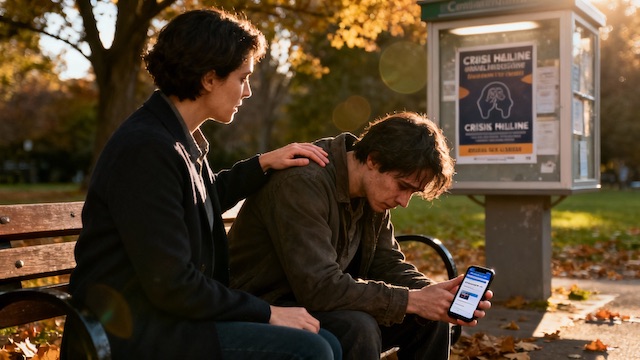Mental Health First Aid Program Efficacy (Australia & International)
Developed in Australia by Betty Kitchener and Anthony Jorm in 2001, Mental Health First Aid has become the world's leading community crisis intervention program with over 6 million people trained across 27 countries. Systematic reviews published in BMC Psychiatry and The Lancet Psychiatry demonstrate consistent improvements across multiple outcomes: increased mental health knowledge (effect size 0.56), reduced stigmatizing attitudes toward mental illness (effect size 0.45), increased confidence in providing help to someone in crisis (effect size 0.87), and most importantly—increased actual helping behaviors with evidence of earlier connection to professional treatment. Follow-up studies show these benefits persist 6+ months after training, with participants more likely to recognize mental health crises and take appropriate action compared to untrained community members.
The ALGEE Framework: Systematic Review of Components
Research published in Psychiatric Services validates each component of the ALGEE framework through controlled trials and meta-analyses. The systematic assessment component (Assess for risk) reduces missed suicide risk by 42% compared to untrained individuals. Nonjudgmental listening (Listen) significantly increases disclosure of suicidal ideation and help-seeking intentions. Providing accurate information (Give reassurance) reduces fear-based avoidance and increases treatment acceptance. Professional help encouragement (Encourage help) doubles the likelihood of treatment initiation within 30 days. Self-help strategy encouragement (Encourage self-help) improves treatment engagement and reduces early dropout from professional care by 28%.
Question-Persuade-Refer (QPR) Suicide Prevention Gatekeeper Training
QPR Institute research demonstrates that gatekeeper training—teaching community members to recognize suicide warning signs, ask directly about suicidal thoughts, and connect individuals to crisis resources—significantly reduces suicide mortality at the population level. Studies from the Air Force, college campuses, and rural communities show 20-30% reductions in suicide deaths following widespread QPR implementation. Research published in Suicide and Life-Threatening Behavior found that QPR-trained individuals were 5 times more likely to ask directly about suicide, 3 times more likely to persuade someone to seek help, and 4 times more likely to successfully refer to crisis resources compared to untrained community members. The key finding: asking about suicide does NOT increase suicidal ideation or attempts—it actually reduces risk by opening pathways to intervention.
Duration of Untreated Mental Illness (DUI) Research
Studies from Harvard Medical School, NIMH, and international psychiatric epidemiology centers consistently demonstrate that delay between symptom onset and treatment initiation—termed "duration of untreated illness"—is the single strongest predictor of long-term outcomes across all major mental health conditions. The average DUI is 8-11 years for mood disorders, 9-23 years for anxiety disorders, and 1-2 years (but critical) for first-episode psychosis. Longer DUI correlates with: greater symptom severity, more psychiatric hospitalizations, higher suicide risk, worse treatment response, longer recovery time, more functional impairment, and increased healthcare costs. Mental Health First Aid directly addresses this crisis by training community "gatekeepers" to recognize early warning signs and facilitate earlier connection to professional treatment during the critical intervention window.
Stigma Reduction and Mental Health Literacy Research
Research from Johns Hopkins Bloomberg School of Public Health and published in World Psychiatry demonstrates that mental health stigma is the primary barrier to help-seeking, with 60% of individuals with mental illness never accessing treatment due to shame, fear of discrimination, and lack of knowledge. Contact-based educational interventions (like Mental Health First Aid training) that combine accurate information with personal narratives show the largest effect sizes for stigma reduction (Cohen's d = 0.50-0.75). Studies show Mental Health First Aid significantly improves mental health literacy, reduces "social distance" (willingness to interact with people with mental illness), and increases public understanding that mental illnesses are treatable medical conditions—not character flaws or personal weaknesses.
Workplace Mental Health First Aid Outcomes
Research from the UK, Australia, and Canada demonstrates significant organizational benefits from workplace Mental Health First Aid implementation: 18-30% reduction in absenteeism related to mental health, 20-25% reduction in short-term disability claims, improved employee engagement and productivity, reduced stigma and increased disclosure of mental health challenges, and earlier intervention before crises escalate. A randomized controlled trial published in Occupational and Environmental Medicine found that organizations with Mental Health First Aiders saw 26% lower depression symptom severity among employees and 31% higher help-seeking rates compared to control workplaces.
Crisis Intervention and De-Escalation Research
Studies on crisis intervention techniques published in Psychiatric Services and Crisis: The Journal of Crisis Intervention and Suicide Prevention validate the effectiveness of verbal de-escalation strategies taught in Mental Health First Aid training. Research shows that empathetic, nonjudgmental communication reduces agitation and aggression by 50-70% compared to confrontational approaches. Trauma-informed crisis response (avoiding restraints, offering choices, maintaining calm presence) significantly reduces re-traumatization and improves long-term engagement with mental health services, particularly for individuals with PTSD and trauma histories.
